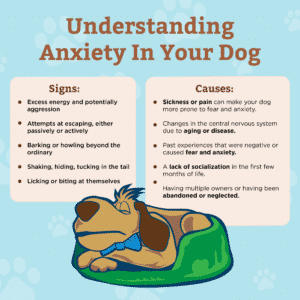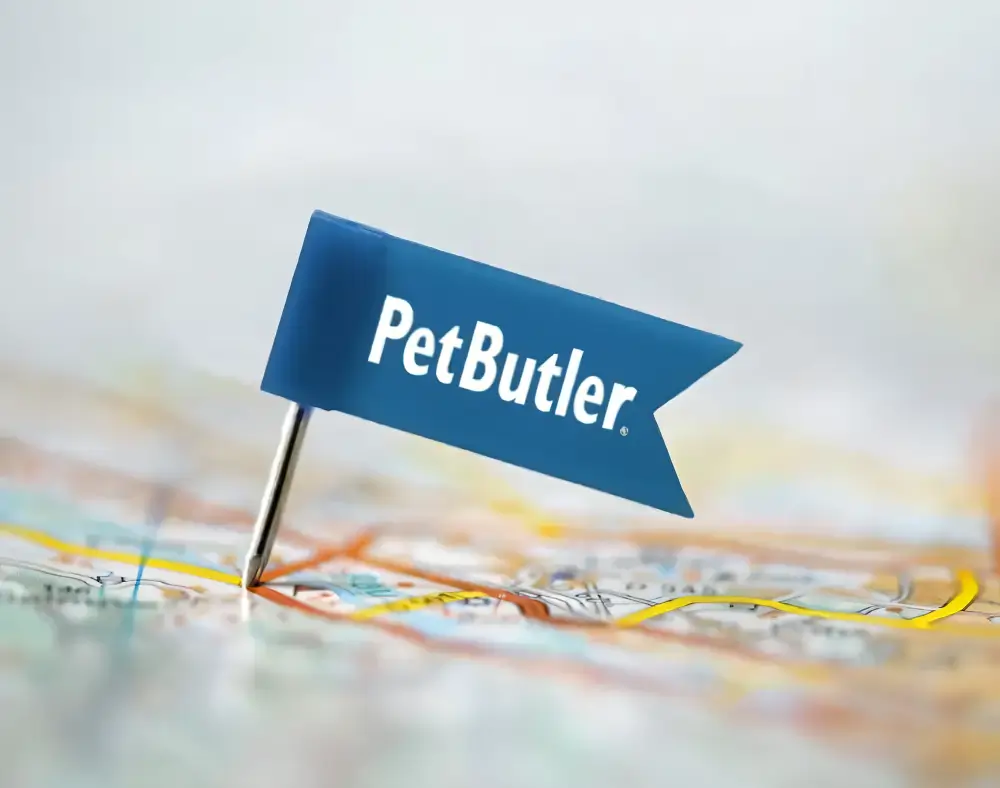Anxiety is not just a condition reserved for humans. Pets can suffer from anxiety too. In fact, as more and more pet owners have been staying home to work, the dependency of pet to owner has become much more significant. For pets that come from shelters or rescues, this dependency and anxiety can be much more intense. This could be due to past neglect and abuse resulting in pet anxiety. The good news is that there are many tools to help pet owners reduce their pets’ anxiety.
What are signs my pet has anxiety?
Every pet deals with anxiety in different ways, but some common signs that can indicate that your pet is stressed out can be:
- Pacing
- Trembling
- Shaking
- Hypervigilance
- Lip licking
- Frequent yawning
- Decreased appetite
- Destructive behavior
- Potty accidents
Once you learn how to detect when your dog is anxious, you can begin to identify the triggers that are causing the anxiety and then try to minimize them. By keeping records of the issues your pet is facing and working closely with your veterinarian, you can help diffuse problems before they occur.

What can cause my pet to have anxiety?
Anxiety can be caused by a lot of external and internal factors. Here are some of the common causes:
- Dog breed – Certain dog breeds are prone to separation anxiety. A first step is to make sure you research any breed of dog that you consider – making sure it fits into your lifestyle. If you are bringing one of those breeds into your home, be sure that you have the time to commit to reassuring, training and setting your anxious dog up for success.
- Pet history – If your pet has a history of abuse, abandonment, or life as a stray can all lead to anxiety that does not automatically go away when he or she enters your loving, stable home.
- Age and health – Your pet may be fine until certain factors such as health issues or old age set in that contribute to their anxiety. Understanding, compassion and schedule changes may be required to help your pet cope.

What are ways to ease my pet’s anxiety?
- Exercise Your Dog – Exercise is a keyway to help your pet deal with separation anxiety. Routine exercise creates a time for bonding with your pet as well as an opportunity to tire out your pet. Playing ball or taking long walks can help burn off excess energy that builds up to cause anxiety.
- Physical Contact – Petting your pet or cuddling with your pet regularly can help reduce his or her anxiety. Especially when your pet is experiencing an anxiety episode, physical contact can help reduce it. Simply picking the pet up, cuddling it on the couch, or giving them a good long petting session can be a great solution.
- Massage – Anxiety causes tensing of the muscles, making massage therapy a perfect way to reduce tension. Keep one hand on the pet for comfort while using the other to massage long strokes along the pet’s body.
- Music Therapy – Both dogs and cats have been shown to respond positively to music therapy as a calming and relaxing effect. Classical music has been extremely impactful for dogs in stressful states.
- Time Outs – When anxiety leads to bad behavior, it may be time for a little time-out session for your pet. Pet crates can allow pets to feel safe and secure and provide a place for them to calm their nerves. Reduced light, lowered motion, and less background activity reduces stress.
- Calming Clothing – Calming clothing items such as coats and t-shirts can offer comfort for your anxious pet. These heavy clothing items offer mild, constant pressure to a pet’s body like the swaddling of a newborn baby.
- Alternative Therapies – Many pet owners have explored natural supplements and alternative products to help pets suffering from anxiety. With the guidance of your veterinarian, you may explore things like CBD, melatonin, thiamin, chamomile, L-Theanine or L-tryptophan to help your pet deal with his or her stress and anxiety.
At Pet Butler, we understand that pet anxiety can have a crippling effect on you and your pet’s relationship. We know you want to give them the best care you can. That is why we specialize in caring for your pet’s special area by scooping up their waste. So, call 1-800-PET-BUTLER to learn how we can make your pet’s life happier, healthier, and cleaner.

